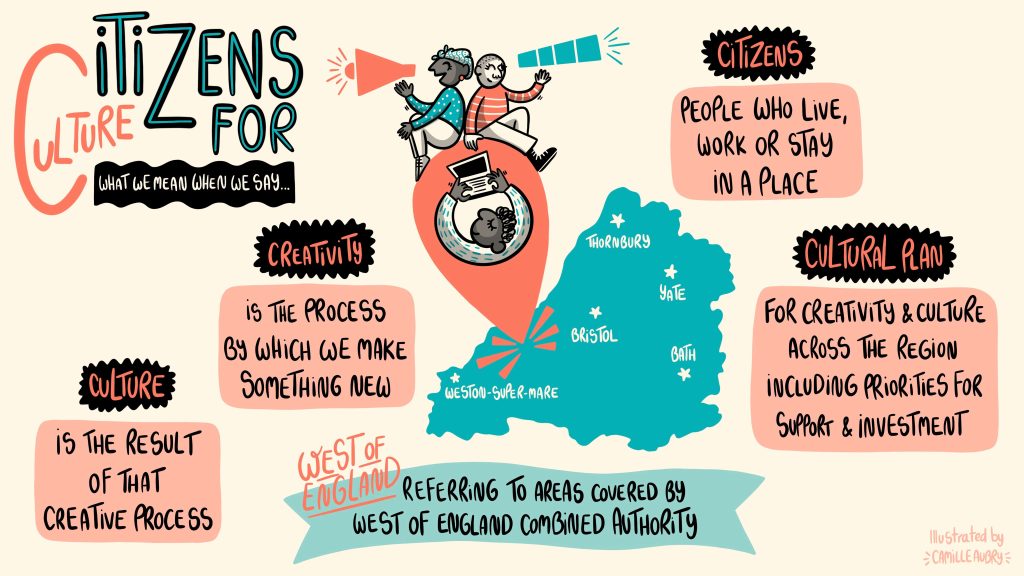
Reflecting on our series of research sessions exploring how citizens can co-create a cultural strategy
Citizens for Culture is a partnership with Trinity Community Arts, St Pauls Carnival and David Jubb of Citizens In Power. Together we are exploring how we can co-create a cultural strategy for the city and surrounding region.
During the research phase, funded by Calouste Gulbenkian Foundation (UK Branch), we invited a range of collaborators from the sector who place participation at the heart of their practice to hear from some of the best speakers working in democratic decision making right now.
Part 5: deliberative workshops
In January and February 2023 we organised three deliberative workshops with the aim of devising a long-term, citizen-led process that will shape a cultural plan for the area.
In our first session, we heard from Sarah James, the creative and cultural programme lead at West of England Combined Authority. She spoke about the Combined Authority’s Cultural Compact – a group consisting of representatives from four Unitary Authorities (Bath and North-East Somerset, Bristol, North Somerset, South Gloucestershire) that aims to focus and amplify the role of culture in the region as a driver for economic success, placemaking, community cohesion and personal wellbeing. Sarah talked us through the evolving Cultural Plan for the region and how this connects with other active cultural conversations in the area.
The group then briefly discussed the application process for previous rounds of the government’s City Of Culture competition, from the initial expression of interest through to the judges’ panel visit and interviews. It was agreed that it would be up to the Citizens’ Assembly for Culture as to whether an application for future competitions would be relevant or not.
The group then moved on to discuss the idea of Deliberation – a key methodology used in Citizens’ Assemblies. We heard from Professor Alan Renwick (Deputy Director at UCL’s Constitution Unit) who described the key components which lead to deliberative and consensus decision-making and how this differs from a more conventional debating approach.
Following this first session, we felt that it would be good to bring some of the principles Alan Renwick discussed to life with a couple of stories from inside a Citizen’s Assembly. Therefore, to start our second deliberative workshop, executive director of St Pauls Carnival and regular Citizens’ Assembly facilitator LaToyah McAllister-Jones shared some stories that helped immerse us back into the world of assemblies, understand more about their conduct, and remind us that there is expertise around these kinds of participatory processes in our teams and region for us to draw on.
Following this, we spent some time delving more deeply into the way Citizens’ Assemblies are organised and delivered. Sarah Allan, one of the UK’s leading experts in Citizens’ Assemblies, who is director of capacity building and standards at Involve, joined us to explore the way assemblies are designed along with some of the perceived strengths and weaknesses of the assembly model. She delved into the governance of Citizens’ Assemblies, and how the different stages of assemblies work. After considering the core components of a Citizens’ Assembly, we deliberated together to create a list of other exercises or approaches that we thought could add value to the assembly model.
In the final session, we came together to explore our ideas for a citizen-led process for the west of England region. We set out to create a long-term and affordable and citizen-led process that could create a Cultural Plan for the region. Our main questions and themes were: How can the process itself be creative & cultural? How can the process be inclusive and diverse at every stage? Who are the stakeholders in the process and how can we bring them on the journey? Could the assembly have a federal structure with sub-groups to reflect the different areas across the region? Based on the experience and discussions from all three of the deliberative workshops, we outlined a process as a basic prototype, to be tested with citizens and the wider sector in autumn 2023.
Privacy Policy | Cookie Policy | Terms and Conditions | Contact Us | Site infomation